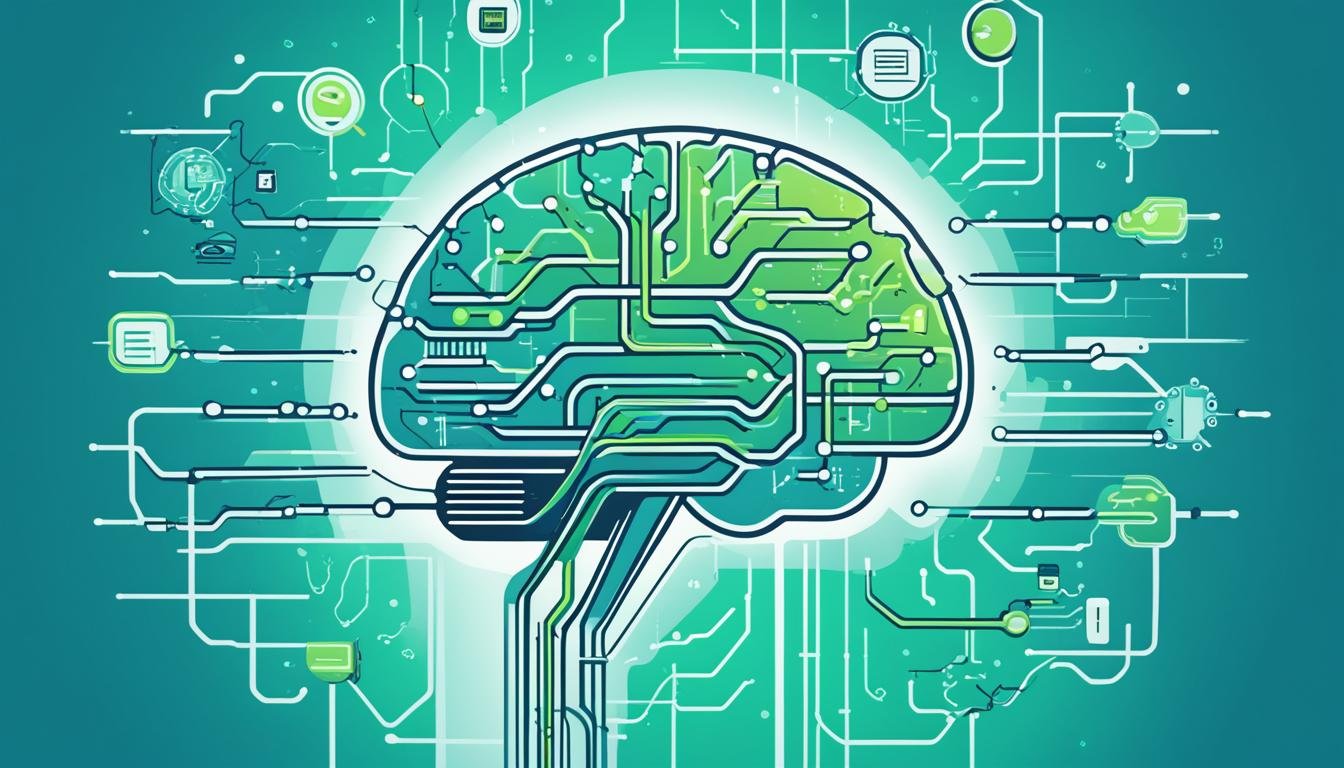AI in Mental Health: Diagnosis and Treatment Support
Did you know that mental healthcare faces a global crisis, with increasing prevalence and high costs? The World Health Organization estimates that around 450 million people worldwide suffer from mental disorders, making mental health one of the leading concerns of our time. However, the current resources and infrastructure to address this crisis fall short, leaving many individuals lacking the support they need.
Key Takeaways:
- AI has the potential to revolutionize mental health diagnosis and treatment support.
- Mental health issues are on the rise globally, creating a need for innovative solutions.
- The integration of AI in mental health research and services can improve patient outcomes.
- AI can reduce symptoms, support chronic conditions, and address burnout and addiction.
- AI has the potential to improve accessibility and equity in mental healthcare.
The Role of AI in Healthcare
Artificial intelligence (AI) has become increasingly integrated into healthcare settings, leveraging its ability to analyze large datasets and identify patterns. One prominent area where AI has made significant contributions is in disease diagnosis. AI algorithms have been utilized to assist in the detection of various medical conditions, such as skin cancers and diabetic retinopathy, with studies suggesting that AI surpasses human doctors in accuracy and consistency when diagnosing these diseases.
The application of AI in healthcare has the potential to enhance the quality of care provided to a larger population. By leveraging its computational power, AI can process vast amounts of medical data, leading to more accurate diagnoses and personalized treatment recommendations. Additionally, AI technologies can automate repetitive tasks, improving efficiency and allowing medical professionals to focus on critical aspects of patient care.
However, the increasing adoption of AI in medicine also raises concerns about the dehumanization of healthcare. The therapeutic relationship between therapist and patient hinges on empathy and trust, elements that may be compromised when human interaction is replaced by AI-driven algorithms. While AI excels at diagnosing certain medical conditions, there are aspects of healthcare, particularly in fields like psychiatry and mental health care, where the human touch remains essential.
Although AI has the potential to optimize healthcare outcomes, it is crucial to strike a balance between technological advancements and preserving human connection in medicine. By leveraging the strengths of both AI and medical professionals, the healthcare industry can harness the full potential of AI to improve disease detection and treatment while upholding the fundamental values of compassion and empathy in patient care.
Advantages of AI in Healthcare:
- Accurate disease diagnosis
- Personalized treatment recommendations
- Efficient automation of repetitive tasks
Concerns and Considerations:
- Potential dehumanization of healthcare
- Preserving empathy and trust in the therapist-patient relationship
- Human elements essential in fields like psychiatry and mental health care
The Global Mental Health Crisis
Mental health issues are on the rise globally, with an increasing number of people diagnosed with various mental disorders. Depression and anxiety are among the most prevalent conditions, causing significant disability and economic burden. The cost of poor mental health is expected to rise even further in the coming years. Despite efforts to improve mental healthcare, little progress has been made, and there are significant inequalities in access to mental health services.
The global mental health crisis necessitates innovative solutions to address the growing demand for mental healthcare.
The Increasing Demand for Mental Healthcare
As the prevalence of mental health disorders continues to rise, there is a pressing demand for effective and accessible mental healthcare services. People from all walks of life are seeking support for their mental well-being, including individuals from diverse socio-economic backgrounds, different age groups, and various cultural contexts.
The demand for mental healthcare is not limited to developed countries but is also evident in developing nations where resources are often scarce. This increasing demand presents a unique challenge for healthcare systems worldwide.
The Cost of Poor Mental Health
“Poor mental health carries a significant economic burden, impacting productivity, healthcare costs, and overall social well-being.” – World Health Organization
The cost of poor mental health goes beyond the individual and extends to society as a whole. It affects productivity in the workforce, increases utilization of healthcare services, and places strains on families and communities. The economic impact of mental health disorders can be substantial, and it is projected to worsen without effective intervention and support.
Addressing the cost of poor mental health requires a comprehensive approach that includes early intervention, accessible treatment options, and destigmatization of mental health disorders.
Addressing the Crisis: Innovative Solutions
To tackle the global mental health crisis, innovative solutions are needed to ensure that mental healthcare is accessible, effective, and tailored to individual needs. Technology, particularly artificial intelligence (AI), has the potential to play a significant role in overcoming the challenges faced by mental health services.
By harnessing the power of AI, mental healthcare providers can expand their reach, improve early detection and diagnosis, and personalize treatment approaches. AI-powered tools can also assist in predicting and preventing mental health crises, enabling timely interventions.
However, while AI can be a valuable tool for mental healthcare, it should complement rather than replace human providers. The human touch, empathy, and understanding are essential in the therapeutic relationship and should not be compromised.
Regional Distribution of Mental Health Disorders
| Region | Prevalence of Mental Health Disorders |
|---|---|
| North America | 20% |
| Europe | 19% |
| Asia | 17% |
| Africa | 14% |
| Latin America | 12% |
| Oceania | 10% |
The distribution of mental health disorders varies across different regions, with North America and Europe experiencing higher prevalence rates compared to other regions. However, it is essential to note that mental health issues affect individuals from all corners of the globe, regardless of their geographical location or cultural background.
In summary, the global mental health crisis requires urgent attention and innovative solutions to address the increasing demand for mental healthcare, the cost of poor mental health, and the significant disparities in access to services. Technology, including AI, can play a crucial role in improving mental health outcomes, but it should be accompanied by adequate human support and care to ensure the best possible outcomes for individuals seeking help.
AI in Mental Health Research and Services
The role of AI in revolutionizing mental health research and services has gained recognition from the World Health Organization (WHO). According to a recent WHO report on AI in mental health, AI offers various advantages, including improved data gathering and analysis, task automation, and enhanced understanding of complex disorders.
However, there are challenges associated with the rapid adoption of AI applications in mental health. Privacy concerns arise due to the sensitive nature of mental health data, and there is a need for greater transparency and data validation to ensure ethical practices.
The World Economic Forum (WEF) has taken steps to address these concerns by developing a toolkit for the ethical and safe use of AI in digital mental health. This toolkit provides guidelines and best practices to ensure responsible implementation and safeguard patient privacy.
Additionally, AI chatbots have emerged as a valuable resource for mental health service referrals. One such AI chatbot, Limbic, has shown positive results in increasing access to mental health services, especially among minority groups and underserved populations.
“AI has the potential to transform mental health research and services by improving data analysis, automating tasks, and expanding access to care. However, it is crucial to address privacy concerns and promote responsible implementation to ensure the ethical use of AI in this field.”
The integration of AI in mental health research and services holds promise for improving patient outcomes and addressing the global mental health crisis. By leveraging AI technologies responsibly and ethically, we can work towards a future where mental health support is accessible, efficient, and tailored to individual needs.
| Advantages of AI in Mental Health Research and Services | Challenges of AI in Mental Health Research and Services |
|---|---|
|
|
By addressing these challenges and leveraging the potential of AI, we can advance mental health research, improve diagnostic accuracy, and ensure that mental health services reach those in need.
AI in Reducing Symptoms and Supporting Chronic Conditions
Artificial intelligence (AI) has emerged as a powerful tool in the field of mental health, providing new possibilities for reducing symptoms and supporting individuals with chronic conditions. Through clinically validated interventions, AI has shown great potential in alleviating symptoms of anxiety and depression.
AI-led support can provide a therapeutic alliance equivalent to a human relationship, offering individuals a sense of understanding and empathy. This technology can effectively assist individuals in managing their mental health, freeing up human support for more critical cases.
In addition to anxiety and depression, AI has also been beneficial in the management of chronic pain. AI-powered chatbots have shown promise in supporting individuals dealing with chronic pain, resulting in higher engagement and adherence compared to traditional methods.
Benefits of AI in Reducing Symptoms:
- Alleviates symptoms of anxiety and depression
- Provides a therapeutic alliance equivalent to a human relationship
- Offers convenient and accessible support
Benefits of AI in Supporting Chronic Conditions:
- Assists individuals in managing chronic pain
- Increases engagement and adherence to treatment
- Offers personalized support and resources
AI’s ability to provide therapeutic support and address chronic conditions has the potential to revolutionize mental healthcare, improving the well-being and quality of life for individuals worldwide.
AI in Addressing Burnout and Addiction
Burnout has become a significant issue in the workplace, impacting mental health and well-being. The relentless demands of today’s fast-paced environment can lead to chronic stress and exhaustion. To address this growing concern, artificial intelligence (AI) has emerged as a valuable tool in providing support and relief.
AI-based mental health support, such as Wysa, offers individuals a convenient and accessible solution to manage stress and anxiety. Through AI-powered chatbots, users can engage in conversations that provide guidance and techniques for stress reduction. These intelligent systems utilize evidence-based approaches to offer support and coping strategies tailored to individual needs.
In addition to addressing burnout, AI can also play a crucial role in addiction treatment. Substance abuse disorders are prevalent and pose a significant challenge to individuals seeking recovery. AI can provide accessible and available support, assisting individuals in forming healthy routines and habits to break the cycle of addiction.
By leveraging AI technology, addiction treatment programs can offer personalized guidance and support to those in need. Through machine learning algorithms, AI systems can analyze user data and provide targeted interventions, helping individuals navigate the recovery journey.
AI’s ability to provide 24/7 support and guidance can be particularly beneficial for individuals in early recovery or those facing relapse episodes. These AI-based tools can serve as a continuous source of encouragement and accountability, empowering users to maintain their sobriety and improve their overall well-being.
As AI technology continues to evolve, the integration of AI in addressing burnout and addiction offers promising possibilities. By leveraging the power of AI, individuals can receive timely and personalized support, enhancing their mental health and fostering successful recovery journeys.
Improving Accessibility and Equity with AI
One of the key benefits of AI in mental health is its potential to improve accessibility and equity. AI-powered platforms and chatbots can provide much-needed mental health support to individuals in rural communities or those who may not have easy access to traditional mental health facilities. By leveraging AI technology, we can bridge the gap in mental health disparities and ensure that everyone has the opportunity to access the care they need, regardless of their geographical location or socio-economic background.
AI-powered digital platforms can offer a range of mental health services, from virtual therapy sessions to self-help resources, at any time and from anywhere. This flexibility allows individuals to seek support on their own terms, eliminating the barriers of distance and limited availability of mental health professionals. By leveraging AI in mental health accessibility, we can democratize mental healthcare and reach underserved populations in a more efficient and cost-effective manner.
Moreover, AI chatbots can act as virtual mental health assistants, providing immediate support and guidance to those in need. These chatbots can offer personalized recommendations, coping strategies, and even crisis intervention. They can be available 24/7, ensuring individuals have access to support whenever they require it, even in the absence of immediate human intervention.
“AI has the potential to remove the geographical barriers that restrict access to mental health services and help those who need assistance but are unable to reach traditional care providers.”
Additionally, AI-powered analytics can help identify mental health trends and patterns, enabling policymakers to design targeted strategies and allocate resources more effectively. By understanding the unique needs of different communities, AI can contribute to the development of tailored mental health interventions and preventive measures.
Benefits of AI in improving mental health accessibility:
- Enabling remote access to mental health services
- Reducing wait times for therapy and diagnosis
- Providing immediate support through AI chatbots
- Enhancing the reach of mental health resources and self-help tools
- Identifying and addressing mental health disparities
By harnessing the power of AI, we can create a more inclusive and accessible mental health care system, breaking down barriers and ensuring that mental health support is within reach for all individuals, regardless of their location or background.
| AI in Improving Mental Health Accessibility and Addressing Disparities | Benefits |
|---|---|
| Remote access to mental health services | Eliminates geographical barriers |
| Faster access to therapy and diagnosis | Reduces wait times |
| 24/7 support through AI chatbots | Provides immediate assistance |
| Increased availability of mental health resources | Expands reach and accessibility |
| Targeted interventions for underserved populations | Addresses mental health disparities |
With AI in mental health, we have the opportunity to transform the way mental healthcare is delivered and ensure that no one is left behind. By leveraging technological advancements, we can create a more equitable and accessible mental health ecosystem that caters to everyone’s needs, irrespective of their circumstances.
The Future of AI in Mental Health
As the global mental health crisis continues to intensify, the future of AI in mental health holds great promise in providing scalable solutions. While AI-based mental health support is still in its early stages, the potential impact is undeniable.
The demand for mental healthcare is rising rapidly, with an increasing number of individuals seeking treatment for various mental disorders. Traditional mental health services struggle to keep up with this demand, leading to long waiting lists and limited accessibility. However, AI offers a scalable solution that can effectively address the growing need for mental health support.
With the continuous evolution of AI technologies, we can expect significant advancements in the field of AI in mental health. These advancements will play a crucial role in improving access to mental health services for people worldwide.
AI has the ability to analyze vast amounts of data, identify patterns, and derive valuable insights that can aid in accurate diagnosis and personalized treatment plans. This can revolutionize the way mental health professionals provide care and support to their patients.
“The potential of AI in mental health is immense. It has the ability to positively impact the lives of millions, providing accessible and effective support for a wide range of mental health conditions.” – Dr. Sarah Johnson, Psychiatrist
Moreover, AI-powered chatbots and virtual assistants have the potential to act as personalized mental health companions. They can provide continuous support, monitor symptoms, offer coping strategies, and connect individuals with appropriate resources. This kind of support can be particularly beneficial for those who face barriers to accessing traditional mental health services.
However, it is important to address the challenges that come with integrating AI into mental health care. Privacy concerns, ethical considerations, and the need for transparent and validated AI models must be carefully addressed to ensure the responsible and safe use of AI in mental health. It is crucial to strike a balance between technological advancements and the preservation of essential human elements in mental health care.
As AI continues to evolve, it holds the potential to revolutionize the mental health landscape. By providing scalable solutions, improving access to care, and enhancing the quality of diagnosis and treatment, AI can significantly contribute to combating the global mental health crisis.
Conclusion
AI has the potential to significantly improve diagnosis and treatment support in mental health. While there are concerns about the dehumanization of healthcare and the loss of human connection, AI can provide valuable assistance in diagnosing mental disorders and supporting individuals in their mental health journeys. The benefits of AI include improved accessibility, reduced symptoms of anxiety and depression, better support for chronic conditions, and addressing issues such as burnout and addiction.
However, challenges such as privacy concerns and the need for ethical implementation must be addressed. As we navigate the future of AI in mental health, it is crucial to strike a balance between technological advancements and maintaining the essential human elements of care. The potential benefits of AI in mental health are vast, but we must proceed with caution, ensuring that AI is used as a tool to enhance, rather than replace, the expertise and empathy of mental healthcare professionals.
By leveraging the advantages of AI, we can improve the accessibility and quality of mental health services on a global scale. AI has the potential to revolutionize the field of mental healthcare, providing innovative solutions to the increasing demand and addressing the challenges posed by the global mental health crisis. As we move forward, it is essential to acknowledge the benefits of AI while proactively addressing the challenges, ensuring that AI in mental health is implemented ethically, responsibly, and with a focus on the well-being of patients.






